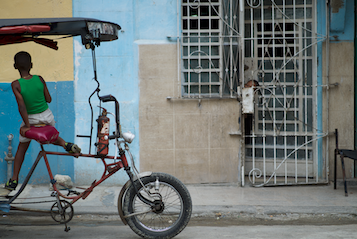Christina Galanakis
August 25, 2017
The Cuban Mafioso
Havana is rich in character from every nook and cranny, so it’s almost impossible to produce images less than perfect. While exploring Havana on this particular day, however, I witnessed a moment in time so picture-perfect that I felt the immediate need to stop and capture it. From the composition to the lighting, it all aligned perfectly. I hadn’t been walking around with my camera that day since I was looking to embed myself into the rest of the population, so I quickly took out my camera, quickly threw it together and did a little mini photo shoot. What was perfect about it in my eyes was the scene and it what it had portrayed itself to me as. It was a man sitting in a parked classic red convertible wearing a fedora. He was talking to a woman leaning over the passenger’s side window, having what looked to be a romantic conversation on a hot and sunny Tuesday afternoon.
If anyone knows me personally, they know that I come from a tight-knit Sicilian family. That’s about all I have to mention before anyone asks twice about my love and appreciation for anything Old Hollywood-esque and with a subject matter relative to the American Gangster. Havana is a time capsule of this era and this photo read to me as the epitome of such.
What started as a motivation to document the character of the city wound up turning into a collection that emphasized the power of eye contact in photography. In this case, I was motivated by nostalgia and an era that I have so much admiration for.
Cuba in the raw
Feeling defeated after having spent the day navigating the streets of Old Havana trying to find a story and coming up empty handed, I decided to edit a short montage of all my clips that night in my hotel room. Aside from finding that editing is a form of therapy for me, reflecting on this footage and piecing it together helped me to better understand not only this country but the media from an alternate perspective.
As a communication student having come from a nation that is so overly saturated by the media, I realized while here in Cuba that our issues, on a very basic level, lie not so much in the quality of reporting, but within the act of truth seeking and reporting in and of itself. Not having a story made me realize that by so desperately pushing and digging, I am more likely to perpetuate, even fabricate, an issue that may not have existed in the first place.
The entire time that I’ve been investigating and digging for special access to stories that haven’t yet been told, it was in cutting this piece that I realized the stories I’ve so tirelessly been searching for are in fact written before my very eyes. Cuba doesn’t need to be unveiled of any facade, nor does it need a narrative. The stories of Cuba are so honestly etched and inscribed within the country’s ruins, its people, their every day lives, and even its natural sounds.







